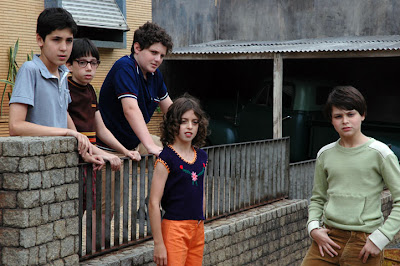 Mauro (Michel Joelsas), right, and Hannah (Daniela Piepszky) with the gang from Bom Retiro.
Mauro (Michel Joelsas), right, and Hannah (Daniela Piepszky) with the gang from Bom Retiro.
Tribeca Film Festival, NYC, April 25-May 6, 2007
The Year My Parents Went on Vacation (O Ano em que Meus Pais Saíram de Férias)
104 minutes
Directed and Written by Cao Hamburger
Starring: Michel Joelsas, Germano Haiut, Daniela Piepszky, Paulo Autran, Eduardo Moreira, Simone Spoladore, Caio Blat
From Brazil
Brazil, 1970: The people are under the iron-fisted rule of a vicious right-wing military dictatorship, but they’ve gone soccer-mad anyway. Everybody, regardless of age, sex, religion, or political affiliation, can’t wait for the impending World Cup tournament to begin. And why not? Pelé’s in his prime, he’s just scored his 1000th goal, and Brazil’s already won two World Cups.
Twelve-year-old Mauro (Michel Joelsas) is a soccer fanatic of the first degree whose ambition is to be a goalie. He obsessively plays a tabletop version of the game, collects pictures of the Brazilian players, and talks passionately about them with his father, Daniel (Eduardo Moreira), a Jewish communist whose wife, Bia (Simone Spoladore), is a Catholic communist.
To avoid arrest, Daniel and Bia have to flee the country, and they tell Mauro that they’re “going on vacation,” promising him that they’ll be back in time for the World Cup. They then drop their son at his grandfather’s house in São Paulo’s Bom Retiro district—which is composed of Yiddish-and-Portuguese-speaking Eastern European Jews—and drive away in their blue Volkswagen Beetle, leaving Mauro standing there holding his suitcase.
It’s hard to believe that loving, responsible parents like Daniel and Bia would, under any circumstances, dump their son on the street without first making sure that the grandfather’s home. But that’s what they do, and it’s this one flaw, as easily overlooked as it may be, that tarnishes an otherwise extraordinary film.
Mauro’s grandfather, the local barber, has died of a heart attack just a few hours earlier, and Mauro’s left to pound on the apartment door until Shlomo (Germano Haiut) the next-door neighbor and superintendent of the synagogue, finds him and tells him what’s happened.
The community gathers in the temple to debate Mauro’s fate. Are they obligated to take care of him because he’s the grandson of a member of the temple? Or is he not their responsibility because he’s a goy—they know this because Shlomo saw Mauro’s uncircumcised penis. To Shlomo’s alarm, they agree that Mauro should live with him until the parents return.
And it’s here we embark on a classic tale, beautifully acted and totally believable, of a goy among the Jews, a twist on the biblical story of baby Moses being taken in by the Egyptians—a fact not lost on the Bom Retiro community; they begin calling Mauro “Moses.” The other twist, of course, is that this is Brazil, a country not exactly known as a hotbed of Old-World Judaism—though an unsuspecting viewer might think that the story were set in Boro Park, Brooklyn, or in Williamsburg before the hipster invasion.
Adrift in this strange milieu, trying to adjust to his situation, Mauro, like a tramp from Godot, waits for his parents to return, seeing them in every car that resembles their blue Volkswagen. He tries his best to get along with Shlomo, despite the fact that the old man feeds him fish for breakfast, which Mauro finds disgusting. (And Shlomo, in turn, tries his best to get along with Mauro, despite the fact that the boy unwittingly desecrates his talis, using it as an accessory for his soccer uniform.)
Mauro also meets Ítalo (Caio Blat), a young revolutionary who knows his father, and the film perfectly captures the look and atmosphere of a student union circa 1970. But mostly, as the adults try to track down his parents, Mauro hangs out with a group of neighborhood kids reminiscent of the gang from The Wonder Years. Though they sometimes play soccer—with Mauro as goalie—the boys have another hobby, which they find infinitely more interesting. Their friend Hannah (Daniela Piepszky) allows them to peep into the changing room of her mother’s dress shop from a secret spot behind the wall—for a price. “First time’s free,” she tells Mauro.
As the entire country comes to a halt to watch the World Cup, Mauro’s parents still haven’t returned, leaving him in despair, unable to enjoy Brazil’s great victory, a moment of national ecstasy tainted by brutal scenes of political repression.
This is the kind of movie that could leave one feeling irrationally hopeful about the state of filmmaking. And one would hope—perhaps irrationally—that it might even provoke a few Hollywood studio heads to ask themselves: Why are we so often incapable of telling a coherent story that isn’t marred by gaping plot holes, and why do we so rarely make films like this?
The Year My Parents Went on Vacation
Sat., April 28, 4:00 PM, AMC Kips Bay-15, 570 Second Avenue (at 32nd Street)
Sun., April 29, 9:45 PM, AMC Kips Bay-14
Tues., May 1, 5:00 PM, Regal Battery Park Cinema-05, 102 North End Avenue (At Vesey Street)
Wed., May 3, 10:15 PM, AMC 34th Street-14, 312 W. 34th Street (bet 8/9 Avenues)

